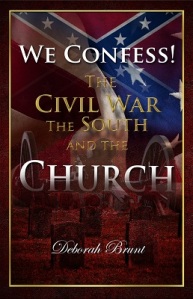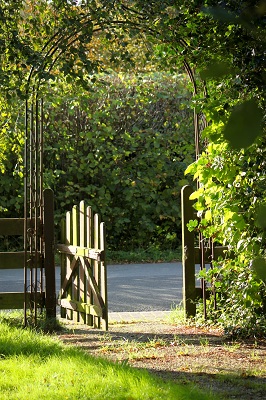In April 2011 and again in April 2014 – on the date when the most state celebrations of the former Confederacy converged – major storms spawned deadly tornadoes and record-breaking floods across the Deep South.
Coincidence?
April 2011, states across the Deep South launched a four-year celebration of the 150th anniversary of the American Civil War.
Every year, eight Southern states still officially observe Confederate Memorial Day.
Yet, the God of covenant love has a different plan for this time – a plan that involves confession and cleansing, not celebration of needless bloodshed. To cooperate with him, we have to let him show us what we haven’t wanted to see: The awakened white church across the South in the early 1800s became deeply double-minded and led the region to secede, to go to war and to vow repeatedly never to yield.
Never means never.
Today, the Southern states that still officially observe a Confederate memorial day don’t all do so on the same date. Indeed, each state has chosen its own date (and some, their own name). Texas commemorates Confederate Heroes Day in January (with a second unofficial observance in April); North and South Carolina, hold their observances in May; and Tennessee commemorates Confederate Decoration Day in June.
Five states observe Confederate Memorial Day in April. The five observances don’t necessarily all fall on the same date. But in 2011 and again in 2014, they did.
April 2011
150th anniversary of the start of the Civil War. Alabama, Florida, Georgia, Mississippi and (unofficially) Texas observed Confederate Memorial Day on April 26.
In We Confess! The Civil War, the South, and the Church, I wrote:
It’s May 2011. Last month and this, a series of disasters has plagued the South. In April, devastating droughts sparked wildfires in Texas and Oklahoma. Meanwhile, five severe weather outbreaks lashed the eastern half of the nation, breaking numerous records in terms of severity, destruction, and deaths. In the words of newscasters themselves, the months’ storms took the heaviest toll in “Dixie.” On the heels of the storms came the Great Flood of 2011. The Mississippi River overflowed its banks from Illinois to the Gulf Coast, nearing and topping 100-year flood levels and causing billions of dollars of damage, most of it in the Deep South.
Of these disasters, the tornadoes produced by far the greatest loss of life. A record-breaking 751 tornadoes occurred – 209 tornadoes more than the previous monthly record, set in May 2003. The two storm systems that primarily hit the Midwest caused great destruction, but no fatalities. Conversely, the three storm systems that plowed through the Deep South resulted in escalating numbers of casualties. April 4-5, nine people died; April 14-16, 43 died; April 25-28, about 340 died.
The April deaths from tornadoes or straight-line winds took place in these states (from greatest to least number of fatalities): Alabama, Mississippi, Tennessee, Georgia, North Carolina, Arkansas, Virginia, Oklahoma, Louisiana and Kentucky.
The month’s last storm system, occurring April 25-28, spawned one of the worst tornado outbreaks in US history. April 27, 2011, became the single deadliest tornado day in the nation since 1925.
Can it be coincidence that April 2011 launched four years of celebrations of Civil War bloodshed? Can it be coincidence that, in the 150th anniversary month, the deadliest tornado day in generations left a staggering death toll across the Deep South, but especially in Alabama, Mississippi and Georgia – the day after those three states and two others commemorated Confederate Memorial Day? Can it be coincidence that all the month’s storm-related deaths took place in former slave states or territories and the vast majority of them in states that still officially commemorate the Confederacy?
April 2014
Alabama, Florida, Georgia, Mississippi and (unofficially) Texas observed Confederate Memorial Day on April 28.
And it happened again. A storm system that launched in Oklahoma and Kansas on Sunday, April 27, quickly turned deadly, taking 15 lives in Arkansas alone. On Monday, April 28, the system careened across Mississippi, Alabama and into Georgia, as well as other Southern states, spewing tornadoes, causing untold destruction and more than doubling the death toll. As the storm pushed eastward on Tuesday, cataclysmic flooding became the greatest devastator, especially on the Alabama and Florida Gulf Coast. Repeatedly, areas hardest hit were said to look like war zones. See more details here.
What if?
 What if God has a purpose for this 150th anniversary of the Civil War, that he expresses in Joel 3:21 (CJB)? “I will cleanse them of bloodguilt which I have not yet cleansed.”
What if God has a purpose for this 150th anniversary of the Civil War, that he expresses in Joel 3:21 (CJB)? “I will cleanse them of bloodguilt which I have not yet cleansed.”
Might the devastating weather events during strategic Confederate celebrations suggest how desperately we need this cleansing? Might the reoccurring siren-sound of wind and waves echo the shouts of a loving Father, crying to the evangelical church culture rooted in the Bible Belt? “Stop pointing fingers at everyone else. I am speaking to you.”
“April 2011” section taken from We Confess! The Civil War, the South, and the Church, by Deborah P. Brunt (WestBow Press, 2011), 10-11. All rights reserved.
Learn about the We Confess … documentary.



